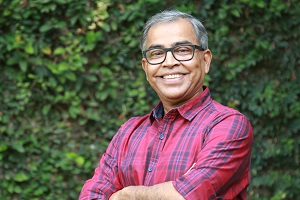-
- Educate mothers: A child, in its formative years, especially in India, is almost always with its mother every day, in most families. This is the time when a child’s character gets moulded. An educated mother, as it were, is critical for education of her child. Children look up to their mothers for answers to all questions – from academic information to social norms, from hygiene and health to values, from nature to sports. Mother is the first teacher and the go-to person for every child. A well-resourced mother, who answers her child’s questions, bequeaths an enduring impression on her child’s all-inclusive development. She inspires her child to grow into a well-formed human being. Educating mothers is, thus, crucial for children’s humanistic growth.
- ‘Will I get a respectable job after school?’: Every school student asks this question. If the answer is yes, I reckon most students will take up jobs rather than higher education. Many school-leavers pursue a college degree because a degree is a prerequisite for jobs. Governments and private agencies employ countless people with degrees in science, humanities, commerce, and engineering to do normal jobs that anyone with good school education can competently accomplish. These jobs require language skills, both written and spoken, reasonable numerical literacy, social skills, good behaviour and values, general knowledge, awareness of current events and today, reasonable familiarity with computers, but not higher degrees. On completion of school education, each person is (should be) capable of performing normal jobs.The key issue is, are we, as a nation, ready to employ capable people with school education, give them salary, status, perquisites and all that come with these jobs, or will we waste national resources to award degrees that they would never ever use in their entire working career. The majority will not force themselves to get a college degree if it is not a precondition for employment.Therefore, employment criteria for both public and private sector jobs must be modified so that capable persons after school be recruited rather than only those with degrees. Orientation programmes, on-job training, upgradation of skills and performance evaluations exist, anyways. This is not to suggest recruitment without any process.The school education system, therefore, must be bolstered. Every child has hard coded ability to explore the unknown, ability to think and learn, independently. Encourage a child by assisting in her exploration, independent thinking and learning, with soft frameworks. Search for alternatives to common standardised evaluation that tests. Allow children to grow organically rather than turning them into weeds in an unkempt garden. Maturity and sagacity come later through experience. The idea of making education more multidisciplinary, therefore, makes immense sense.
- Make school teachers wealthy: The best talents must be school teachers. Everybody knows this. But why does this not happen? Because society respects the wealthy and the powerful. Essentially, it is economics. Therefore, we must make our school teachers as wealthy as people in any other profession. Provide them the infrastructure for developing flexible pedagogy. Give them the freedom to experiment. Make them accountable for their actions and deeds. Reward them for excellence and passion. Allow them to decide and create content and mode of delivery. This would, of course, entail more investment in school education. There is no dearth of talented people with passion, compassion, and integrity, if they are compensated handsomely. Talent search is best left to the talented, free from political interference.
- Do not overcrowd higher education facilities: If, after school, people get respectable jobs, the demand for higher education will drastically reduce. Even in a knowledge economy, requirement for specialised technical skills would be much less than that for normal skills (though different). Thus, there will be fewer degree-seekers. Therefore, it is not necessary to increase admissions to degree programmes. More importantly, there is no need to create more universities and colleges with lavish infrastructure. Current universities can focus on students genuinely interested in higher education, and use academic resources, more effectively. The idea is to not push young capable minds towards higher education that they do not need, but for a piece of paper. Instead, allow them to earn a dignified livelihood that they deserve. This will save substantial resources that could be used to strengthen school education.
- Adopt ‘zero defect or none’ policy: The need for high quality education cannot be exaggerated. The best talent, with integrity and fervour, is elemental for this. Therefore, a zero-defect teacher selection system, devoid of interference, must be ascertained. Allow teachers the freedom to build excellent institutions. Let them devise measurements of quality. Let them not run behind ranking agencies and decide their activity basket to suit ranking requirements. Institutions of learning are not manufacturing industries. The quality of educational institutions cannot be judged by number of graduates they “produce” nor by the number of printed pages of research they publish. Neither can it be judged by, for example, the sports complex (that remains almost unused) on campus. The quality of education is assessed by the quality of human beings it nurtures, and, in turn, the society it fosters – a society where selfishness, greed, coercion, inequity, and injustice cannot prosper. If this is accomplished, the objects of physical comforts will ensue.

Dr Malay Bhattacharyya is a Professor in the Decision Sciences area at IIM Bangalore. In an academic career of over three decades, he has published in academic journals and conference proceedings. His research interests include Quantitative Finance, Time Series and Extreme Value Theory.
